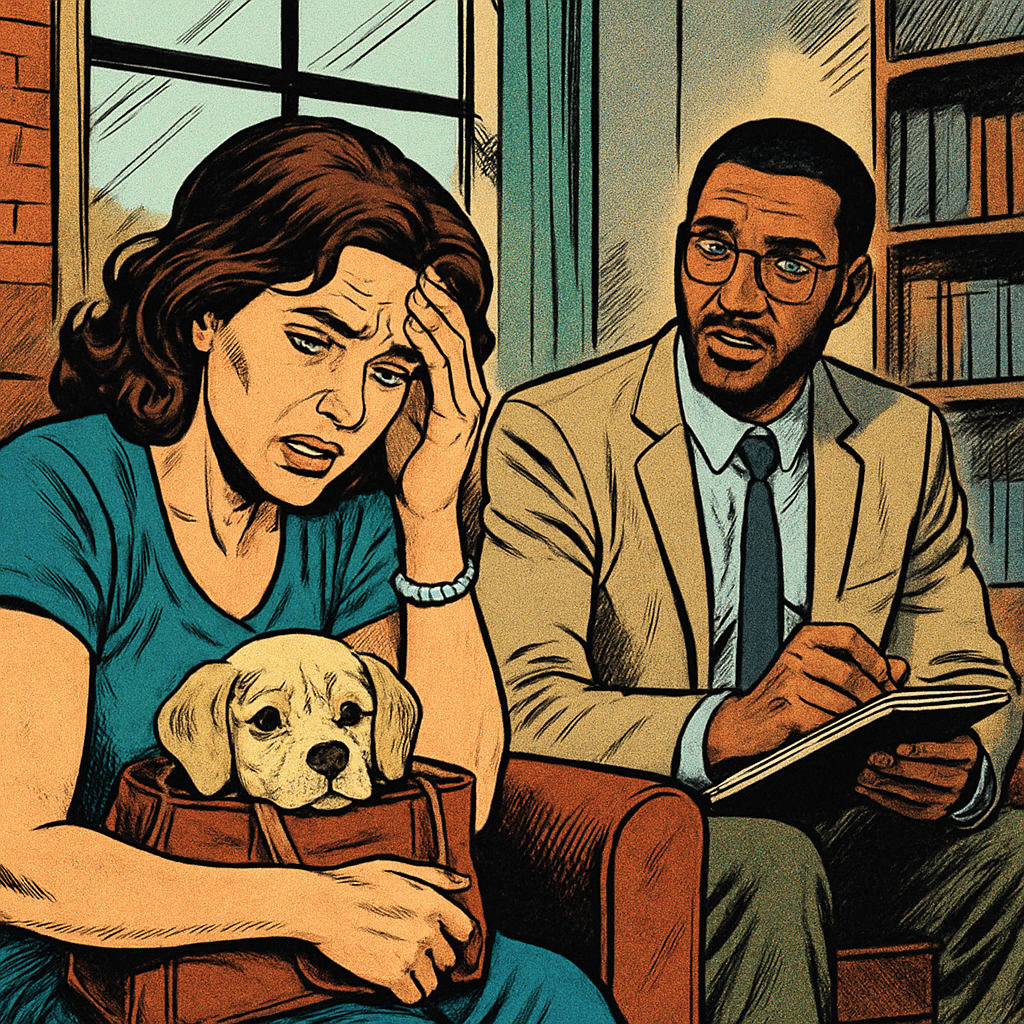🧠 When Other People’s Opinions Become Your Inner Voice
Emily carried her overheated puppy home through Manhattan’s concrete inferno last summer. Three days later, she sat in my office, still shaken by a stranger who’d verbally accosted her for it.
“He came at me, Lola. Literally walked toward me, demanding I put my puppy down in 101-degree heat. Who does that?” she asked, twisting her diamond tennis bracelet anxiously. “And why can’t I stop replaying it?”
I’ve spent 25 years listening to New Yorkers dissect their romantic catastrophes, but sometimes it’s the seemingly minor confrontations with strangers that crack open the most revealing fault lines. Emily wasn’t just upset about Angry Sidewalk Man. She was questioning her entire decision-making apparatus.
“I keep thinking maybe he was right. Maybe I’m overprotective. Maybe I don’t know what I’m doing with this puppy. Maybe I don’t know what I’m doing with anything.” And there it was—the moment a random sidewalk interaction becomes an existential crisis.
💭 The Emotional Colonization Effect
What fascinated me about Emily’s case wasn’t the incident itself but how completely this stranger’s words had colonized her thoughts. This wasn’t just about a dog. The emotional charge of this encounter had attached itself to deeper narratives about her competence and self-trust.
Every single one of us walks around with these little packets of emotional information—sensations, feelings, needs, and stories all bundled together. When someone challenges us, especially aggressively, these packets can explode like tiny emotional grenades, spreading shrapnel into parts of our lives that seem completely unrelated.
Emily was a successful architectural project manager who could confidently direct teams of contractors, yet here she was, undone by one angry man’s opinion about dog parenting. The real problem wasn’t the man or even the incident—it was how easily external voices become internal critics.
“Do you question yourself this much in other areas of your life?” I asked.
“Only in everything that matters,” she admitted.
🐕 The Critical Window of Self-Trust
What Emily didn’t realize is that those early weeks with her puppy paralleled something critical in her own development. Just as puppies have a socialization window where early experiences shape their future responses to the world, we humans have periods where we either develop trust in our own judgment or learn to constantly seek external validation.
The puppy wasn’t the only one in a formative period. Emily was becoming a caregiver, developing confidence in a new role. And just as negative experiences can create lasting fear responses in puppies, negative feedback during our own transitions can create lasting self-doubt.
“I’ve never had something so dependent on me before,” she confessed. “What if I’m not doing it right?”
The irony is that Emily had made exactly the right call. Puppies that young shouldn’t walk long in extreme heat. Their developing joints can’t handle it, their tolerance for extreme temperatures is limited, and their needs for positive experiences outweigh arbitrary rules about exercise.
Emily knew this intellectually. She’d done her research. But knowledge isn’t the same as trust, and trust in yourself is what enables you to stand firm when challenged.
🔍 Questions That Restore Your Internal Compass
Ask yourself these questions the next time someone’s opinion throws you into a spiral:
- Would I value this person’s advice in other areas of my life? 🤔
- Is their reaction about me or about something happening in their world?
- Am I questioning myself because of actual evidence or because someone was loud and confident?
- What would I tell a friend who came to me with this exact situation?
- If I’m wrong, what’s the actual worst-case scenario?
🔄 Reframing the Narrative
Emily and I spent several sessions unpacking why this incident had burrowed so deeply under her skin. It wasn’t just about the puppy. It was about her relationship with authority, her fear of disapproval, and her habit of abandoning her own judgment when confronted with someone else’s certainty.
We all have emotional frames—those invisible lenses that shape how we interpret events. Emily’s frame contained a deeply held belief that other people knew better than she did, especially when they expressed themselves forcefully. This frame wasn’t just affecting her dog-walking decisions; it was influencing her romantic relationships, her career choices, and her entire sense of self.
By our final session, Emily had stopped asking “Was he right?” and started asking “Why do I give strangers power over my self-perception?” That’s when I knew she’d found the real issue.
✨ The Victory Lap
The last time I saw Emily, she’d just returned from a morning walk with her now six-month-old puppy. “Someone told me I shouldn’t use a harness,” she said with a smile. “I thanked them for their concern and kept walking.” 🚶♀️
💡 Core Insight
The opinions that echo longest in our minds are usually speaking to wounds that were there long before the words were spoken.
— Lola Adams, who has noticed that the most confident-sounding advice often comes from people who have never lived the questions they’re so eager to answer
https://pmc.ncbi.nlm.nih.gov/articles/PMC6067676/
https://www.olk9md.com/prevent-aggressive-and-reactive-behaviors-in-puppies/
https://behaviory.com/blog/puppy-socialization-science/
https://k9maniadogtraining.com/managing-puppy-aggression-a-quick-guide/
https://indoorpet.osu.edu/dogs/puppy/socialization
https://hsmo.org/portfolio-item/puppy-behavior-and-training-socialization-and-fear-prevention/

